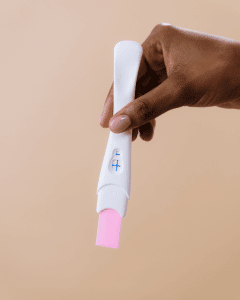Why am I spotting at 4 weeks pregnant?
First of all, congratulations are in order! And how amazing that you can start your pregnancy journey so early!
If you’re experiencing spotting at 4 weeks pregnant, there’s likely no need to panic. There are many changes to your body during pregnancy so there’s usually a simple explanation to your spotting.
Considering that you’re 4 weeks pregnant, you’re probably feeling both nervous and excited. You might even be starting to experience 4 weeks pregnant symptoms.
Spotting is often referred to as implantation bleeding, which is completely normal in pregnancy.
This article includes:
- Can you get spotting at 4 weeks pregnant?
- Why am I spotting at 4 weeks pregnant?
- Where is the baby located at 4 weeks pregnant?
- 4 weeks pregnant spotting and cramping
- 4 weeks spotting when I wipe
- Brown spotting 4 weeks pregnant
- Light pink spotting 4 weeks pregnant
- 4 weeks pregnancy ultrasound
- When should I see the midwife when spotting at 4 weeks pregnant?
Can you get spotting at 4 weeks pregnant?
Yes! Spotting can happen during the early stages of pregnancy. By 4 weeks pregnant, you can definitely expect it.
Following your pregnancy test and positive result, you may choose to start taking vitamin D. This helps protect your bones and immune system.
To remain healthy during the beginning of your pregnancy, you should take folic acid. Folic acid is one of the best prenatal vitamins to promote a healthy pregnancy up to 12 weeks.
Did you know that pregnancy is measured from the first day of your most recent period and not the date of conception? If you’re 4 weeks pregnant then a missed period was probably your first sign of pregnancy, followed by a home pregnancy test.
Having a regular monthly period can make it easier to work out how far along you are.
You might want to consider purchasing a pregnancy calendar so that you can keep track of important dates and your current pregnancy week. It may also help you to track your pregnancy symptoms.

Why am I spotting at 4 weeks pregnant?
Even though light spotting is usually nothing to worry about, it is common to feel anxious about it. At the end of the day, you’re growing a baby that you want to care for and protect. You probably want to understand why you are spotting at 4 weeks.
Implantation bleeding
Spotting at 4 weeks pregnant typically occurs when the embryo is implanting itself into your uterus. In other words…your baby is getting comfy!
Implantation bleeding can occur within two weeks of conception and can last for up to one week.
Ectopic pregnancy
An ectopic pregnancy is something to be aware of as it can be very serious. An ectopic pregnancy occurs when the baby implants itself elsewhere, this is commonly in the fallopian tube.
Symptoms can include vaginal bleeding, pain in the stomach or shoulder, discomfort when visiting the toilet or diarrhoea.
If you start feeling faint, dizzy, and sick or your tummy pains get worse, you may be suffering from a rupture. This requires fast medical attention.
Irritation
In the first 4 weeks of pregnancy, the body can feel like it’s going through a lot. Your cervix will already be starting to prepare for labour which can lead to irritation and discomfort. These can be more likely to occur after sex.
Infection of the sex organs
Spotting can occur due to an infection, whether that be sexually transmitted or otherwise. If you believe that you may have an infection, speak to your midwife to organise a reliable test and treatment.
Miscarriage
One of the biggest worries for pregnant women is miscarriage and spotting can sometimes be a sign of this. A miscarriage at 4 weeks pregnant is likely due to a problem with the baby, hormones or blood clots.
Unfortunately, most miscarriages do happen during the first trimester of pregnancy. It’s very important to seek medical attention if you believe you are suffering from a miscarriage.
For more information about a miscarriage in early pregnancy, you can read our article 5 weeks pregnant miscarriage.

Where is the baby located at 4 weeks pregnant?
At 4 weeks pregnant, your baby is the size of a poppy seed, tiny right?
At this early stage of pregnancy, your baby will be planting itself in the lining of your womb. Your baby will use layers to attach to your blood supply, so you can provide them with the nutrients they need.
- Layer 1 – As your baby grows, this inner layer will become the lungs, stomach, gut, and bladder.
- Layer 2 – This middle layer is responsible for the circulatory system, muscles, bones and your baby’s heart.
- Layer 3 – The outer layer is the last to form and includes the brain and your baby’s nervous system. The skin, nails, tooth enamel and eye lenses will eventually form here too.
The early stages of pregnancy are crucial to your baby’s growth and development. Layers 1 and 2 are usually completely formed by week 12, and layer 3 continues to form throughout pregnancy.
Your baby is also surrounded by the amniotic sac. This is a thin layer that’s filled with fluid to protect your baby and maintain a healthy temperature.

4 weeks pregnant spotting and cramping
With all of that growth and implantation in your womb, it is common to experience some light bleeding, or specifically, in the case of this blog, spotting at 4 weeks pregnant during pregnancy. You may also experience mild cramping at 4 weeks pregnant.
Cramping in the early stages of pregnancy is normal as the fertilized egg implants into your uterine wall. However, if you begin to find the pain too much or you’re worried about other complications, you should seek help.
4 weeks pregnant spotting when I wipe
For many women, spotting occurs when they go to the bathroom. Although it may be alarming, this is also normal and is just your body removing what it does not need.
For others, spotting can occur throughout the day without going to the bathroom. The way that spotting occurs is not usually anything to worry about. If your spotting is heavy or bright red, you should seek advice.
Brown spotting 4 weeks pregnant
Most women experience brown discharge, it can even occur after a period. Brown spotting at 4 weeks pregnant is usually just the uterine lining leaving the body.
The reason for brown spotting is due to this often being old blood, which could be from your last period.
Light pink spotting 4 weeks pregnant
Light pink spotting during early pregnancy is not usually a cause for concern. Remember, your growing baby is only the size of a poppy seed, so there’s lots of room to move around! As the embryo, protected by the sac of amniotic fluid plants itself against the uterine wall, spotting is common.
During pregnancy, your body goes through a lot of changes. These can include physical changes, such as breast tenderness, fluctuating hormone levels or even morning sickness. You may also experience mood swings due to the hormone progesterone.
A pregnancy hormone that you should be aware of is human chorionic gonadotropin (hCG). Because this hormone is only present during pregnancy, there are high levels of it during the first trimester.
When experiencing pregnancy complications, a blood or urine test can be used to measure your hCG levels.

4 weeks pregnant ultrasound
Some parents choose to attend or are invited to an early scan at 4 weeks pregnant. This allows the baby’s development to be measured more closely throughout the pregnancy.
If you experience spotting at 4 weeks pregnant, you may be advised by a medical professional to attend an early scan. This can help to rule out any pregnancy issues. You may also be invited if you have had complications with a previous pregnancy.
At a 4 weeks pregnant ultrasound you may only be able to see a small white dot on the screen. You may be given an estimated due date during the scan.
When should I see the midwife when spotting at 4 weeks pregnant?
As we mentioned, a bit of light spotting is usually nothing to worry about. But for some women, it can be due to a serious complication. If you experience spotting with other symptoms such as tummy pains or dizziness, you should seek help.
Additionally, if you believe you are suffering from an ectopic pregnancy, miscarriage or STI, you must take action quickly.
Your healthcare professional may invite you for a transvaginal ultrasound. During which a wand is inserted into the vagina so that the uterus can be examined. This type of ultrasound is used at 4 weeks pregnant due to your baby being so small.
A transvaginal ultrasound is a common way to spot ectopic pregnancies, miscarriages or signs of other issues. They may even be able to spot potential birth defects.
Attending an ultrasound scan often provides you with a little more peace of mind during the early stages of pregnancy.
Hey there, I’m Abigail!
In 2022, I graduated with a First Class Degree in Marketing and since then, I have been working as a blogger and Marketing Assistant. Before heading to university, I also achieved a BTEC in Children’s Play, Learning and Development.
I have been blogging for over four years and have covered many topics during this time. My focus has been on pregnancy, babies, sleep and baby name ideas.
I am passionate about learning new things and helping others. I hope that you find my blogs useful and informative. See you in the next article!


















